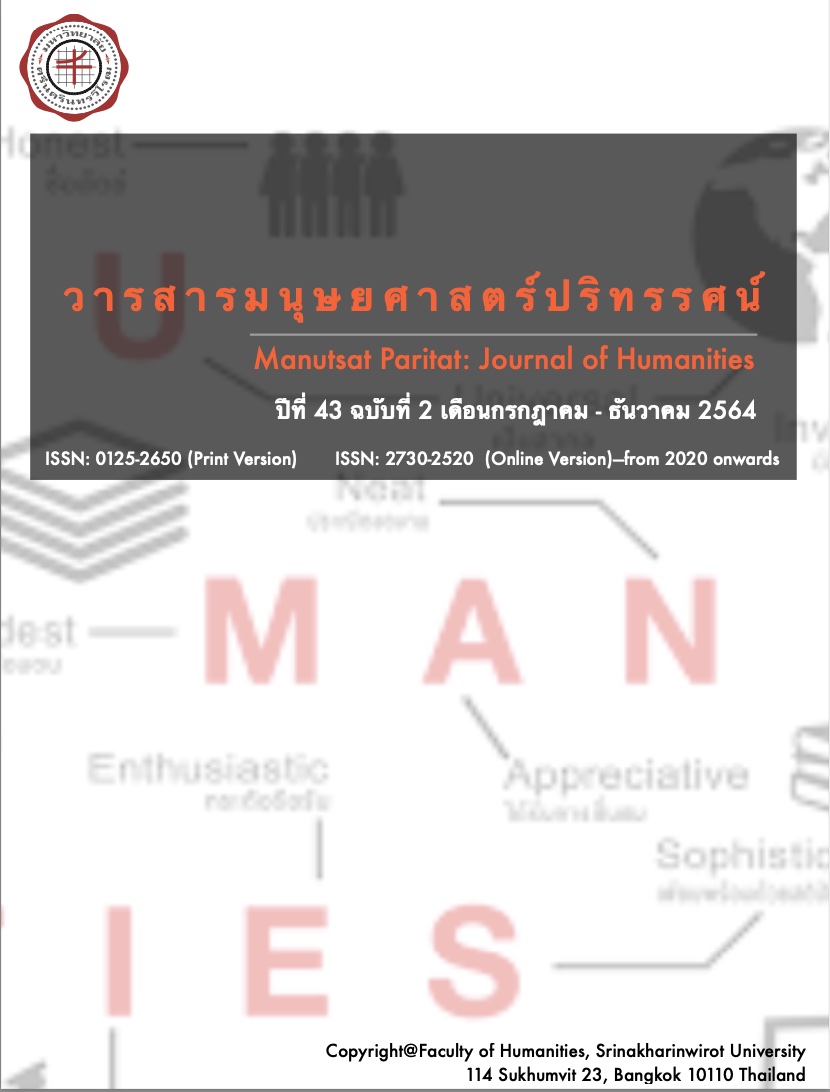The Search for Meaning in Life through Students’ Experiences in Political Participations during 2020-2021
Main Article Content
Abstract
The purpose of this study was to understand the process of searching for Meaning in Life to student’s experiences of participation in politics with reference to the period in 2020-2021. This study used qualitative research as a case study methodology and comprising of in-depth interviews. The key informants recruited by purposive sampling were 5 undergraduate students. The credibility of them was made by using data, and the data was examined by investigator triangulation and peer debriefing. The result of this research showed that the search for Meaning in life to student’s experiences of participation in politics with reference to the period in 2020-2021 divided into 5 stages and found the main issue at each stage. Start with 1) Perception consists of seeing the importance of politics, awareness of the problem that should be solved, recognition of injustice in society, and seeing the movement of the people from the same political ideology. 2) Action consists of the dissemination of information and was a part of political activities. 3) Goals consist of social awareness and country improvement. 4) Sources of meaning consists of social support and hope for change. 5) Meaning in Life consists of for the benefit of others and something that can be changed. Findings of this study. It can apply as a basis for understanding the process of meaning-making that is specific to students. It can use to explain that why do students find meaning in life through political participation?
Article Details
Any unauthorized copying, publication, reproduction or distribution of copyrighted works appeared in Manutsat Paritat: Journal of Humanities is an infringement of the copyright owners’ rights. To authorize the copying, publication, reproduction or distribution of copyrighted works to be appeared in other printed materials or any online media, please write to MPJHthaijo@gmail.com for permission.
References
Arens, A. K., & Watermann, R. (2017). Political efficacy in adolescence: Development, gender
differences, and outcome relations. Developmental psychology, 53(5), 933–948.
https://doi.org/10.1037/dev0000300
Bargh, J. A., Chen, M., & Burrows, L. (1996). Automaticity of social behavior: Direct effects of
Trait construct and stereotype activation on action. Journal of Personality and Social
Psychology, 71(2), 230–244. doi:10.1037/0022-3514.71.2.230
Battista, J., & Almond, R. (1973). The Development of Meaning in Life†. Psychiatry, 36(4), 409–
DOI: 10.1080/00332747.1973.11023774
Baumeister, R. F. (1991). Meanings of life. New York: Guilford.
Braun, V., & Clarke, V. (2006). Using thematic analysis in psychology. Qualitative Research in
Psychology, 3(2), 77–101. doi:10.1191/1478088706qp063oa
Cho, E.H., Lee, D.G., Lee, J.H., Bae, B.H., & Jeong, S.M. (2014). Meaning in Life and School
Adjustment: Testing the Mediating Effects of Problem-Focused Coping and Self –
Acceptance. Social and Behavioral Sciences, 114 :777-781. DOI: 10.1016/j.sbspro.
12.784
Datu, J. A. D., & Mateo, N. J. (2015). Gratitude and life satisfaction among Filipino adolescents:
The mediating role of meaning in life. International Journal for the Advancement of
Counselling, 37(2), 198–206. DOI: 10.1007/s10447-015-9238-3
Ebtsam, A. A. H., & Neama, M. F. K. (2014). Identity, political efficacy and expected political
participation among nursing students after 25th January revolution. Journal of Public
Administration and Policy Research, 6(4), 69–76. doi:10.5897/jpapr2014.0283
Frankl, V. E. (1967). Psychotherapy and existentialism: Selected papers on logotherapy. NY:
Washington Square Press.
Latham, G. P., & Locke, E. A. (2007). New Developments in and Directions for Goal-Setting
Research. European Psychologist, 12(4), 290–300. doi:10.1027/1016-9040.12.4.290
Lin, L. (2019). Is Searching for Meaning in Life Related to Civic Engagement?: Individual- and
Society-Level Moderators. Frontiers in Psychology, 10. doi:10.3389/fpsyg.2019.01334
Santos, M.C., Magramo, C.S., Oguan, F., Paat, J., & Barnachea, E.A. (2012). Meaning in Life and
Subjective Well-Being: is a Satisfying Life Meaningful? Researchers World, 4(1), 32-40.
Schnell, T., & Hoof, M. (2012). Meaningful commitment: finding meaning in volunteer work.
Journal of Beliefs & Values, 33(1), 35–53. doi.10.1080/13617672.2012.650029
Stavrova, O., & Luhmann, M. (2015). Social connectedness as a source and consequence of
meaning in life. The Journal of Positive Psychology, 11(5), 470–479. doi.10.1080/
2015.1117127
Stillman, T. F., Lambert, N. M., Fincham, F. D., & Baumeister, R. F. (2010). Meaning as Magnetic
Force. Social Psychological and Personality Science, 2(1), 13–20. doi.10.1177/1948550610
Tedeschi, R., & Calhoun, L. (2004). Posttraumatic Growth: Conceptual Foundations and
Empirical Evidence. Psychological Inquiry, 15(1), 1-18. Retrieved May 10, 2021, from
http://www.jstor.org/stable/20447194
Tezci, E., Sezer, F., Gurgan, U., & Aktan, S. (2015). A Study on Social Support and Motivation.
The Anthropologist, 22(2), 284–292. doi.10.1080/09720073.2015.11891879
Veronese, G., Pepe, A., Sala, G., Yamien, I., & Vigliaroni, M. (2019). Positive experience,
psychological functioning, and hope for the future as factors associated with mental
health among young Sub-Saharan internally displaced people (IDP): A quantitative
pilot study. International Journal of Mental Health, 1–23. doi.10.1080/00207411.
1635849
กันยารัตย์ เมืองแก้ว. (2561, มกราคม-มิถุนายน). ความหมายในชีวิต: ตัวแปรด้านความเข้มแข็งเชิงจิตวิทยา.
วารสารศึกษาศาสตร์ มหาวิทยาลัยศิลปากร, 16(1), 10. สืบค้นจาก https://so02.tci-thaijo.org/
index.php/suedujournal/article/view/170581/122601
สกล วรเจริญศรี. (2545). การศึกษาปัจจัยที่เกี่ยวข้องกับพฤติกรรมทางเพศของนักเรียนวัยรุ่น.
(ปริญญานิพนธ์ปริญญามหาบัณฑิต, มหาวิทยาลัยศรีนครินทรวิโรฒ, กรุงเทพฯ). สืบค้นจาก


